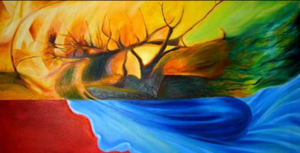Talk:Universe Derives its Properties from Īshvara
By Sri Vishal Agarwal
In the Bhagavad Gītā, Kṛṣṇa describes Himself as the essence present within all aspects of the universe. He identifies with natural elements, qualities, and virtues that sustain and regulate existence.
- "I am the taste in waters, the radiance in the moon and the sun. I am the syllable Oṃ in all the Vedas. I am the sound in space and the masculinity in men. Gītā 7.8"
- "I am the pure fragrance in earth and the brilliance in fire. I am the life in all beings and the austerity in ascetics. Gītā 7.9"
- "Know Me to be the primeval seed of all creatures. I am the intelligence of the intelligent, and the splendor of the splendid. Gītā 7.10"
- "I am the might of the mighty, devoid of desire and passion. I am the desire in beings which is not contrary to dharm. Gītā 7.11"
- "Intellect, knowledge, freedom from delusion, forbearance, truth, self-discipline, tranquility, pleasure, pain, existence and non-existence, fear and fearlessness. Gītā 10.4"
- "Non-violence, same-mindedness, contentment, austerity, charity, glory, and infamy – these various states of beings arise from Me alone. Gītā 10.5"
Story: The Divine Wisdom that Leads to Bhagavān[edit]
A narrative from the Kena Upaniṣad illustrates the principle that the powers of the universe function only through Brahman. The five elements—earth, water, fire, space, and air—once became arrogant, believing themselves to be the sole basis of creation. To teach them otherwise, Brahman appeared before them in the form of a mysterious stranger.
When Fire claimed its ability to burn everything, Brahman placed a blade of grass before it and said, Burn this then. Fire tried, but the blade of grass did not burn.
Air then stepped forward and said, I can blow anything away. Brahman placed the same blade of grass before it, saying, Blow this then. Air tried, but it could not move the grass. The other elements also failed when challenged in turn.
Bewildered, the elements turned to their master, Indra, who came to investigate. By then, the stranger had vanished, and in His place appeared Umā, symbolizing spiritual knowledge. Indra asked her about the stranger, and Umā explained: That was Brahman, the Supreme Being. It is by the will of Bhagavān that the wind blows, the rivers flow, the fire burns, the space contains all, and the earth supports life. The sun rises by His command, the stars twinkle due to Him, and the moon shines by His grace. Knowing this, one realizes that Bhagavān alone is the source of all power and properties of the universe. By realizing Him alone, one attains mokṣa.
References[edit]
- ↑ From the Kena Upaniṣad of the Sāmaveda.

